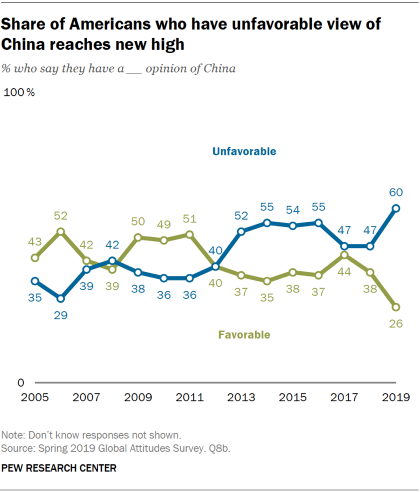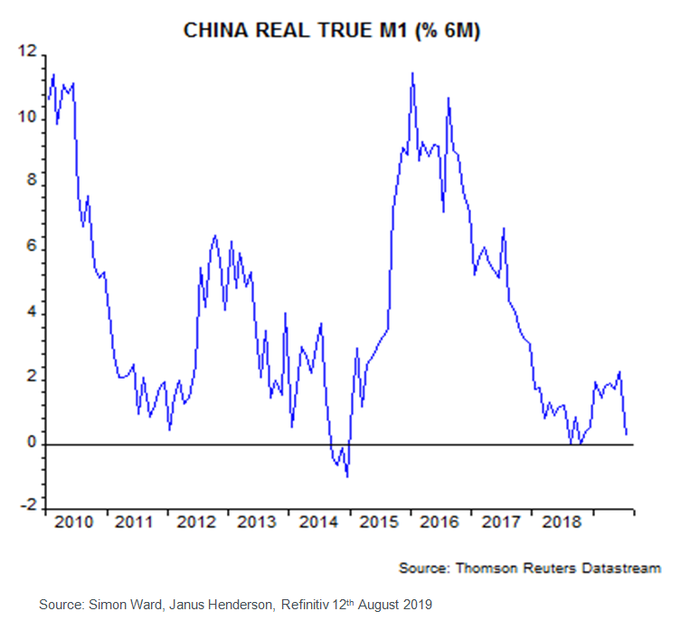Remember the China story of three years ago? That China was on its way to be the greatest economy in the world & bypassing a declining America in virtually every way? Remember how they forced President Obama to disembark from the back of Air Force One in Beijing instead of from the front.
Enter Trump. He was virtually the only American leader who said wait a minute – the only reason China is supposed to be great is that they take $500 billion from America every year and America is too meek to resist; the only reason China is catching up to America is that they are forcing US companies to surrender technology and they are stealing what they cannot get that way. He said America can’t become great again until America stops China’s predatory actions. And he promised it would be easy to win over China.
He was ridiculed by his opponents. And now they tell us how the Chinese think long term and how America is hurt by its short term focus. We now hear how President Trump has to win the next election while President Xi does not face such electoral pressures.
The reality seems just the opposite.
1.Is Xi in trouble?
Bloomberg’s Tom Keene invited George Friedman of Geopolitical Futures to get his feedback about China, Hong Kong and President Xi. We urge all readers to listen to the 6-7 minute long podcast. A quick summary of Friedman’s comments on the podcast & on BTV is below:
- “2008 was a rattling experience for China, an export addict; Xi was brought in to solve these problems. He can’t solve any of them; he didn’t manage Trump; he hasn’t made any progress in the South China sea; One Belt One Road initiative has kind of fallen apart; His most important job was handling his biggest customer and he has failed to do that; So in the Central Committee very quietly there is a discussion about what’s going to happen. Xi is nervous & that will wind up resulting in his going into Hong Kong“
In contrast, President Trump is almost sitting pretty given the current slate of Democrat candidates for 2020. And he has brought his country to his side against China. Look what this week’s Pew poll revealed:
- “Today, 60% of Americans have an unfavorable opinion of China, up from 47% in 2018 and at the highest level since Pew Research Center began asking the question.”
 Look when China’s unfavorable rating began to rise? When 2017 began, just as President Trump took over as America’s President. And when a democratically elected leader gets his country behind him, he gets stronger on that issue, not weaker.
Look when China’s unfavorable rating began to rise? When 2017 began, just as President Trump took over as America’s President. And when a democratically elected leader gets his country behind him, he gets stronger on that issue, not weaker.
In contrast, as Dr. Friedman told Tom Keene, President Xi is getting increasingly nervous as members of China’s Central Committee have begun whispered discussions about him. If that is happening in Beijing, what might be happening across the country in local regions & provinces that have not benefited economically as much as the coastal regions have.
Dr. Friedman amplified his thoughts in an article titled China and a Global Economic Contraction. We urge all to read this article.
2. Foundation of Today’s China
What is it? Communism, Maoism, National Pride or Prosperity? Friedman is clear – “The foundation of China is prosperity; national pride is just a substitute.”
Friedman adds,
- “Today’s China was built on economic growth and the promise of prosperity. Maoism still exists, but it is on the margins. Chinese elites, like elites everywhere, expect greater wealth and, at minimum, that the wealth they have already accumulated will be protected. And the public expects a better life for themselves and especially their children. The Communist Party of China, therefore, now derives its legitimacy not from communist ideology but rather from the promise to deliver prosperity to the people, coupled with national pride. “
And that promise of prosperity was based on China’s huge export machine & its ability to coerce buying nations to keep importing from China. But instead of keeping a gentle respectful tone to their dealings with America, Xi’s China built up an aura of Chinese pride.
Enter Trump. He imposed trade tariffs on China & publicly threatened to make them worse. Not only were his actions dangerous for China, his public comments insulted Chinese pride. President Xi reacted and made the situation much worse than it needed to get. He did not learn from Japan’s Abe. Instead, he acted like Putin without Putin’s relative economic independence from America. Instead of managing Trump, he provoked Trump by going back on a deal their trade negotiators had apparently reached.
This was a major failure of President Xi and the Chinese leadership realizes that “their relationship with the United States has gotten out of control.” And that may be threatening a global economic slowdown, the last thing a large exporting country needs.
3. Foundational Risk for China
Not only is Chinese pride getting bruised, their economy is being hurt.
- Jenna & John @StrategicBond – China credit data was awful in July – here’s Simon Ward’s adjusted real M1 data which has worked beautifully for years now
Simon Ward provides details & charts in his article Chinese policy easing still isn’t working. A few excerpts are below:
- Chinese July money numbers were very disappointing, signalling that an economic recovery remains distant. More decisive monetary policy easing is urgently required but the authorities are constrained by a teetering RMB and surging food prices.
- Six-month growth of narrow money dropped sharply in July, reversing a four-month improvement – see first chart. Broad money growth (not shown) was similarly weak.
- Money / credit growth in real terms – i.e. relative to consumer prices – was additionally depressed by a rise in six-month inflation to an eight-year high, reflecting strong food prices, which were up by 9.1% in July from a year earlier. Real narrow money growth dropped back to near its late 2018 low – second chart.
- The authorities are relying on fiscal stimulus to boost the economy but may be forced to reopen the credit sluice gates. Such action, however, risks cratering the currency. As well as falling through 7 against the US dollar, the RMB has now breached 2017-18 lows against the official currency basket – fourth chart.
See how pride becomes the biggest risk for a nation run by an autocrat. A huge nation that faces a 9.1% rise in food prices should be buying lots & lots of food from the world’s biggest producer/exporter of food. Instead, Xi & his colleagues have announced they will not buy Ag products from America as a retaliation for Trump’s tariffs.
How dumb is Xi? Friedman explains,
- “In the end, national pride goes only so far in a country that is divided into many social classes, with millions left out of the economic boom and others having benefited but remaining resentful of the avariciousness of the elite. The foundation of China is prosperity; national pride is just a substitute.”
President Xi should have tried to learn from Prime Minister Modi who runs a much poorer country with hundreds of millions of people in worse economic conditions. Unlike Xi, Modi has been totally focused on doing as much as he can to improve living conditions, not of the elite or upper middle class, but of the poor. That is why PM Modi won his re-election in a landslide.
Unfortunately for him, President Xi has never run or has to run in an election. China’s leadership survives from the recognition of their strength & the vast reach of the Chinese intelligence system. And double unfortunately for him, China’s intelligence system “failed to anticipate the uprising in Hong Kong.” That, to Dr. Friedman, “raises the question of whether a pillar of the Chinese system, its internal controls, is weakening.”
4. Hong Kong, China, Xi & Trump
In Dr. Friedman’s opinion,
- “China tried to dramatically increase its control of Hong Kong, not out of confidence but out of fear. If the Chinese economy contracts, Hong Kong doesn’t want to be taken down with it. But the people of Hong Kong couldn’t predict how far they would be able to separate the island from China’s problems, so they wanted to ensure their security apparatus had control of Hong Kong. The Chinese resistance to these steps was what really led to the uprising.”
There is no doubt that this Hong Kong crisis is a big negative for President Xi. And President Trump’s politely expressed & seemingly helpful tweets with an offer to help Xi with Hong Kong are adding to Xi’s loss of face. Imagine the autocratic head of the next global superpower being offered help from his biggest adversary in his own country & city.
Add to that the humiliating spectacle of Chinese protestors singing the American National Anthem in Hong Kong and raising American flags.
President Xi is without doubt both mortified and livid. But is he in control? Dr. Friedman writes,
- “Hong Kong has not triggered a reaction on the mainland, but Chinese President Xi Jinping has been wrong on several fronts, so the Central Committee may not be in the mood to let him handle this problem. But it is caught between its need to suppress the protests in Hong Kong and its fear of the consequences if it does. When decisive action becomes a threat, it’s a sign that a regime is in trouble. China has tried to appear patient, but it is increasingly appearing impotent to its own people. And that is the one thing it can’t tolerate.”
On the other hand, the Hong Kong situation may have become too big & too dangerous for America & President Trump too. Hong Kong, by itself, is the 5th largest economy in the world and a great amount of wealth is resident in Hong Kong including real estate, private equity & the world’s largest corporations. It is still a major global banking center & its downfall could create massive problems for global banks like HSBC. And we all know that the easiest way for contagion to spread globally is via the inter-connected banking system and the global stock markets.
President Trump can watch a lot with equanimity but not a steep & confidence-damaging fall in the US stock market. And it might be safer to deal with a chastened President Xi instead of a new leader who may want to show his own strength & power.
So is there a short term Trump-Xi rapproachment in the cards? Not a comprehensive long term deal but a mutual pat on the back with China stepping forth to buy large quantities of US food (to quell China’s food inflation) & US alleviating some pressure on Huawei & postponing some tariffs.
But what about Hong Kong? The scariest thought is that even Chinese leadership may not know. As Dr. Friedman concludes in his article,
- “Having encountered resistance, it fears the consequences of decisive action. And it fears not acting. China doesn’t know quite what to do, and that is not the behavior of a formidable rising power.”
And that might be the most damaging result of the Trump-led US-China fight – a worldwide recognition that China is not guaranteed to be the next dominant global superpower. That in itself should count as a major victory for President Trump.
Send your feedback to editor@macroviewpoints.com Or @MacroViewpoints on Twitter
